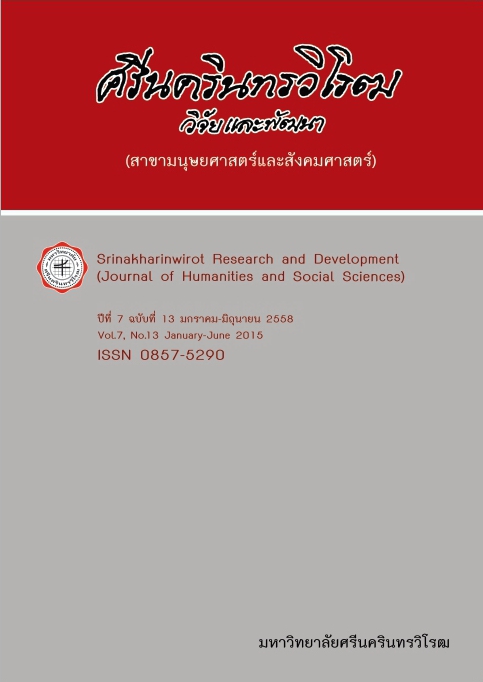การวิเคราะห์องค์ประกอบเชิงยืนยันความเป็นปึกแผ่นของครอบครัวตามทัศนะของวัยรุ่นไทยในเขตกรุงเทพมหานคร A CONFIRMATORY FACTOR ANALYSIS OF FAMILY SOLIDARITY IN THE OPINIONS OF THAI TEENAGERS IN BANGKOK
Keywords:
ความเป็นปึกแผ่นของครอบครัว วัยรุ่น การวิเคราะห์องค์ประกอบเชิงสำรวจ การวิเคราะห์องค์ประกอบเชิงยืนยันAbstract
บทคัดย่อ
การวิจัยครั้งนี้มีวัตถุประสงค์เพื่อวิเคราะห์องค์ประกอบโมเดลความเป็นปึกแผ่นของครอบครัวตามทัศนะของวัยรุ่นในเขตกรุงเทพมหานคร ความเป็นปึกแผ่นของครอบครัวที่ศึกษาเป็นความสัมพันธ์ระหว่างบิดามารดาและบุตร ที่นำมาจากแนวคิดของ Bengtson และ Schradar (1982) กลุ่มตัวอย่างเป็นนักเรียนชั้นมัธยมศึกษาปีที่ 3 ในโรงเรียนสังกัดสำนักงานคณะกรรมการการศึกษาขั้นพื้นฐานในเขตกรุงเทพมหานคร จำนวน 1,058 คน เครื่องมือที่ใช้ในการวิจัยเป็นแบบสอบถามและแบบวัดความเป็นปึกแผ่นของครอบครัว การวิเคราะห์ข้อมูลในขั้นแรกเป็นการวิเคราะห์องค์ประกอบเชิงสำรวจ วิเคราะห์ด้วยโปรแกรมสำเร็จรูปทางสถิติ SPSS ในขั้นที่สองเป็นการวิเคราะห์องค์ประกอบเชิงยืนยันอันดับสอง วิเคราะห์ด้วยโปรแกรม LISREL ผลการศึกษาพบว่า ความเป็นปึกแผ่นของครอบครัวตามทัศนะของวัยรุ่นประกอบด้วยองค์ประกอบ 4 ด้าน ได้แก่ การทำกิจกรรมร่วมกัน ความรู้สึกผูกพันทางอารมณ์ต่อกัน ความสมานฉันท์ และการมีน้ำใจเอื้ออาทรต่อกัน ทั้ง 4 องค์ประกอบร่วมกันอธิบายความแปรผันที่เกิดขึ้นในความเป็นปึกแผ่นของครอบครัวได้ร้อยละ 54 โดยความสมานฉันท์ เป็นองค์ประกอบที่มีน้ำหนักความสำคัญมากที่สุด จากผลการตรวจสอบความสอดคล้องของโมเดลกับข้อมูลเชิงประจักษ์ด้วยค่าสถิติต่าง ๆ พบว่า โมเดลความเป็นปึกแผ่นของครอบครัวตามกรอบแนวคิดการวิจัยสอดคล้องกับข้อมูลเชิงประจักษ์
Abstract
This study aims to analyze a model of family solidarity in the opinions of Thai teenagers. Model of family solidarity was developed and validated, based on the concept of Bengtson and Schradar (1982). The samples consisted of 1058 Mattayom Suksa 3 (M3) students in schools under the jurisdiction of the Commission for Basic Education in Bangkok area. Data were collected by questionnaires with family solidarity scale. Analyzed data by Exploratory Factor Analysis using statistical package program SPSS to extract the components of family solidarity. The model was validated by Second Order Confirmatory Factor Analysis using LISREL program. The results indicated that family solidarity in the opinions of Thai teenagers consisted of four components: association, affection, consensus, and concerning. The four components accounted for 54 % of explained variation in family solidarity. Consensus component had the strongest loading on family solidarity. The statistical test indicated that family solidarity model were congruent with the empirical data.Downloads
Downloads
Published
How to Cite
Issue
Section
License
Srinakharinwirot Research and Development Journal of Humanities and Social Sciences is licensed Under a Creative Commons Attribution-NonCommercial-NoDerivs 4.0 International (CC-BY-NC-ND 4.0) License, Unless Otherwise Stated. Please Read Journal Policies Page for More Information on Open Access, Copyright and Permissions.



